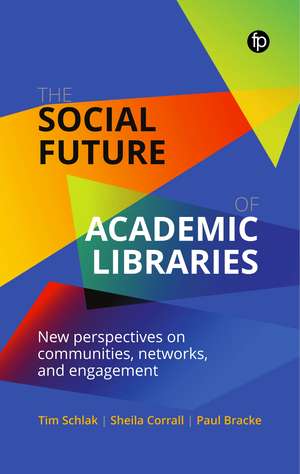The Social Future of Academic Libraries: New Perspectives on Communities, Networks, and Engagement
Autor Tim Schlak, Sheila Corrall, Paul Brackeen Limba Engleză Paperback – 22 dec 2022
This book introduces readers to these ideas and uses case studies from real-world experience to show how intellectual and social capital perspectives and social network theory can strengthen strategic development, collaborative relationships and professional leadership across all areas of library activity. Examples of application areas include academic liaison, collection development, data services, information literacy, library fundraising, service design, space utilization, and student success.
| Toate formatele și edițiile | Preț | Express |
|---|---|---|
| Paperback (1) | 225.30 lei 24 ore | |
| Facet Publishing – 22 dec 2022 | 225.30 lei 24 ore | |
| Hardback (1) | 684.40 lei 3-5 săpt. | |
| Facet Publishing – 22 dec 2022 | 684.40 lei 3-5 săpt. |
Preț: 225.30 lei
Preț vechi: 450.60 lei
-50% Nou
Puncte Express: 338
Preț estimativ în valută:
43.12€ • 45.49$ • 35.93£
43.12€ • 45.49$ • 35.93£
Carte în stoc
Livrare din stoc 22 noiembrie
Preluare comenzi: 021 569.72.76
Specificații
ISBN-13: 9781783304714
ISBN-10: 1783304715
Pagini: 200
Dimensiuni: 156 x 234 x 25 mm
Greutate: 0.5 kg
Ediția:1
Editura: Facet Publishing
Colecția Facet Publishing
ISBN-10: 1783304715
Pagini: 200
Dimensiuni: 156 x 234 x 25 mm
Greutate: 0.5 kg
Ediția:1
Editura: Facet Publishing
Colecția Facet Publishing
Public țintă
Professional Practice & DevelopmentCuprins
The Social Future of Academic Libraries
Notă biografică
Tim Schlak is Dean of the University Library at Robert Morris University in Pittsburgh, PA. As Library Dean, he advocates on the Library’s behalf and positions it as an integral partner in the learning and scholarly processes of the University. Prior to joining Robert Morris, he was Library Director at Northwestern College in Orange City, IA, where he spearheaded the DeWitt Learning Commons project. Tim earned a PhD and MLIS from the University of Pittsburgh’s School for Information Sciences as well as an MA from the University of Pittsburgh’s Department of Slavic Literatures and Languages. He has authored a number of publications about the changing social context of libraries with particular emphasis on social capital and engagement.
Sheila Corrall is Professor of Library and Information Science in the Department of Information Culture and Data Stewardship at the University of Pittsburgh, PA, where she is lead faculty for academic information services. Prior to joining Pitt in 2012, she was Head of the iSchool at the University of Sheffield, following a distinguished career in the field as a library practitioner, serving as director of library, information, and academic services at three universities in the UK. She read Classics at the University of Cambridge, and studied Librarianship at the Polytechnic of North London, then gained her M.B.A. from Roffey Park Management College and M.Sc. in Information Systems at the University of Southampton. Sheila’s research interests include evolving roles in academic libraries, reflective practice in information work, and the application of business management concepts and models to information services.
Paul Bracke is Dean of Library Services at Gonzaga University. In this role, he provides leadership and oversight for Library Services, the Office of Sponsored Research and Programs, and the Academic Technology Applications Support unit. Previously, he was Associate Dean for Research and Assessment and Associate Professor of Library Science at the Purdue University Libraries where he developed internationally recognized research support services, including the development of research data support services and institutional and data repositories. He holds a PhD in Higher Education from the University of Arizona, an MS in Library and Information Science from the University of Illinois at Urbana-Champaign, and a BA in History and Journalism from the University of Missouri-Columbia. He has published and presented on the social relations of librarians and emerging roles for librarians, particularly in relation to research.
Sheila Corrall is Professor of Library and Information Science in the Department of Information Culture and Data Stewardship at the University of Pittsburgh, PA, where she is lead faculty for academic information services. Prior to joining Pitt in 2012, she was Head of the iSchool at the University of Sheffield, following a distinguished career in the field as a library practitioner, serving as director of library, information, and academic services at three universities in the UK. She read Classics at the University of Cambridge, and studied Librarianship at the Polytechnic of North London, then gained her M.B.A. from Roffey Park Management College and M.Sc. in Information Systems at the University of Southampton. Sheila’s research interests include evolving roles in academic libraries, reflective practice in information work, and the application of business management concepts and models to information services.
Paul Bracke is Dean of Library Services at Gonzaga University. In this role, he provides leadership and oversight for Library Services, the Office of Sponsored Research and Programs, and the Academic Technology Applications Support unit. Previously, he was Associate Dean for Research and Assessment and Associate Professor of Library Science at the Purdue University Libraries where he developed internationally recognized research support services, including the development of research data support services and institutional and data repositories. He holds a PhD in Higher Education from the University of Arizona, an MS in Library and Information Science from the University of Illinois at Urbana-Champaign, and a BA in History and Journalism from the University of Missouri-Columbia. He has published and presented on the social relations of librarians and emerging roles for librarians, particularly in relation to research.
Descriere
This book introduces uses case studies from real-world experience to show how intellectual and social capital perspectives and social network theory can strengthen strategic development, collaborative relationships and professional leadership across all areas of library activity.









